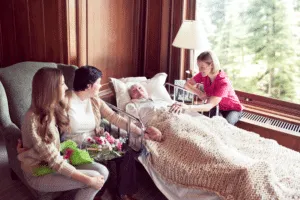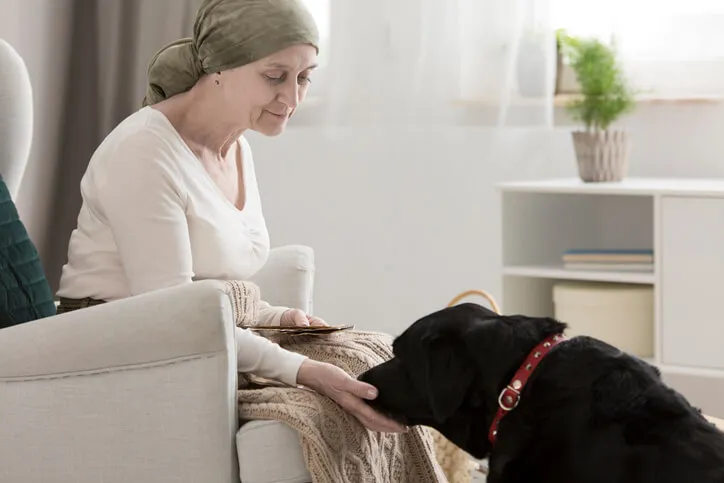Dying is a natural part of life, yet it can be fraught with challenges and uncertainties. Each person's journey is unique and can be impacted by various physical, emotional, spiritual, and practical needs. For some, the dying process may take months, while for others, it might take only a few days.Recognizing these complexities, caregivers have developed a comprehensive framework of four main goals that address end-of-life care. This article explains the four main goals in detail. It explores how caregivers (including the hospice care team and palliative care team) can support and provide compassionate care to an individual in their final stage of life.

Potential Goals of Care
Before determining the four main goals of end-of-life care, health care professionals will typically exhaust all possible treatment options to cure or manage an individual's life-limiting illness to prolong their life. Additionally, there are a variety of potential goals of care that health care professionals may consider before determining whether palliative care or hospice care is appropriate for a person nearing the end of their life.Some of these potential goals of care include [01]:
- Cure of disease
- Avoidance of premature death
- Maintenance or improvement of function
- Prolongation of life
- Relief of suffering
- Optimized quality of life
- Maintenance of control and independence
- A good death
- Support for families and loved ones
Making end-of-life decisions is complex and sensitive, especially for doctors and nurses who must navigate the medical and ethical considerations involved. Determining when someone is at the end of life, healthcare providers assess a variety of factors, including the person's condition, prognosis, and personal wishes and values.While these decisions are incredibly emotional and challenging, the healthcare team is committed to providing compassionate care and respecting the individual's end-of-life wishes and best interests.At Nurse Next Door, we understand this is a highly sensitive and difficult topic, so we are here to support and guide those seeking to understand the end-of-life decision-making process better.
4 Main Goals of End-of-Life Care That Health Care Professionals Focus On
Once a person is deemed palliative or ready for hospice care, the health care team will utilize the four main goals of end-of-life care to ensure that they live their final months with dignity while achieving a good death.For end-of-life care, the four main goals are:
1) Physical Comfort & Symptom Management
Physical comfort and symptom management are the primary goals of end-of-life care. The compassionate health care team ensures patients are as comfortable as possible during their final months.Someone nearing the end of life may experience physical discomfort due to their terminal illness or a range of different sources. However, depending on the cause of their physical discomfort, several strategies can be employed by the medical care team or by a caregiver to help alleviate the discomfort they feel when they are passing.Some areas of discomfort that can arise with a dying person are:
- physical pain
- breathing difficulties
- skin irritation or itchiness
- digestive issues
- temperature sensitivity
- fatigue
By identifying the source of discomfort and providing the appropriate interventions, the medical team and caregivers can help minimize a person's pain and symptoms while improving their overall quality of life during the dying process.Doctors and caregivers may also work closely with the individual's loved ones to develop a plan for managing symptoms and providing comfort care. This could include:
- Medications - for example, other painkillers.
- Massage - for example, light and warm touch to ensure the person feels supported and touched and eases tension or pain.
- Physical positioning - for example: moving a person's head to be angled properly on the pillow. Or moving their physical position in bed to avoid a condition called pressure ulcers.
- Supportive measures - for example: using continuous lateral rotation therapy, which uses an automatic repositioning hospital bed to support a patient and ensure they are not in one position for a prolonged period to avoid pain and bed sores. Patients can then feel comfortable and maintain optimal circulation for a longer duration.
- Supportive environment - for example, family members and caregivers may work together to ensure that the room is set at a comfortable temperature and surrounded by calm and peaceful conversations.
The goal is to ensure a dying person is as comfortable as possible so that the family and themselves can focus on what matters most during their final days or weeks.

2) Mental and Emotional Supportive Care
End-of-life care can comprise mental and emotional support. Whether it's fear, emotional distress, anxiety, sadness, grief, or a combination of various emotions, healthcare professionals understand that a dying person and their loved ones may face various emotions during this hard time. It is a crucial goal for caregivers and the health care team to ensure patients and their family members feel supported emotionally and mentally during this difficult time.One way a care team can achieve this goal is to guide the family into supporting the dying person in various ways. This support could involve providing emotional and compassionate services to all affected. Services could include:
- Counseling.
- Connecting patients and their loved ones with spiritual or religious resources.
- Simply being a listening ear for those who need to express their feelings.
Ways the family can contribute to providing mental and emotional support could be:
- Playing comforting music, for instance, playing religious music is a way to comfort the patient and the family during passing.
- Setting a comforting mood in the room using soft lighting and warmer temperatures.
- Provide physical touch, for instance, holding their hand frequently.
- Being present. Even if the dying person is unable to communicate verbally, simply being present with them can have a profound impact.
The health care or palliative care team can support and empathize with the family and dying person in many ways. By providing mental and emotionally supportive care, professionals can help patients and their families find peace, comfort, and meaning in the final days or weeks of their life.

3) Spiritual Needs
The spiritual needs of a person can be just as important as physical comfort or emotional support as a goal. Many people nearing the end of life may be grappling with deep questions about the meaning of life and death and may seek solace and guidance through spiritual beliefs and practices.Caregivers, the palliative care team, or the hospice care team may work closely with individuals to understand their end-of-life wishes and spiritual needs while connecting them with the appropriate resources, such as chaplains, counselors, or religious figures. They may also work closely with family members to help develop spiritual care plans that address end-of-life beliefs and needs. By providing the necessary spiritual support, caregivers can ultimately instill some comfort, meaning, and purpose in an individual's final days or weeks of their life.
4) Practical Support
Several practical support tasks must be accomplished in palliative care or hospice care when someone nears the end of life. These tasks aim to relieve the dying person and relieve the primary caregiver if they need a break.A person approaching the end of life or living with a life-threatening illness may find that even simple tasks become impossible. Primary caregivers and doctors understand this issue and are committed to providing practical assistance so that individuals can live as comfortably as possible near the end. This could involve tasks pertaining to daily living, like bathing, feeding, and personal support. Or little things like chores, laundry, feeding pets, etc., can cause worry to a dying person.Everyday tasks can become a seriously worrisome hindrance for someone dying, and it can overwhelm a caregiver to manage it all on their own. Respite care is a great resource to temporarily relieve primary caregivers of their duties, so they can take a much-needed break and focus on what matters most - especially if they're a family member of the passing individual.Ultimately, the goal of practical support and tasks in end-of-life care is to help patients focus on what truly matters- spending quality time with their loved ones and finding peace and comfort in their final days.

The four main goals of end-of-life care: physical comfort, emotional and mental support, spiritual care, and practical assistance are all essential components of providing holistic and compassionate caregiving to individuals and their families during the final stages of life. These goals are created to help caregivers deliver the best possible care to terminally ill patients with complex needs that extend beyond their physical health.At Nurse Next Door, we understand the complexities of end-of-life and the challenges many families face during these difficult times. We believe that death shouldn't be viewed as a tragic event but rather as a natural and cherished experience that can be filled with love, warmth, and dignity. We are truly dedicated to providing the highest level of support, palliative care, hospice care, respite care, and caregiving possible.Our caregivers and nurses are dedicated to helping clients and their family members find peace, comfort, and meaning in the last months, weeks, and days of a person's life. We are here to support your family and loved ones every step of the way and believe every client deserves to be treated with compassion, respect, and kindness. Our Care Team can help make the end of life a memorable, meaningful, and cherished experience.
Nurse Next Door is here to help you with end-of-life care and support you while you live at home for longer. We'd love to set up a FREE Caring Consult™ to build an end-of-life care plan catering to your needs and budget.
Give us a call toll-free at +1(877) 588-8609 to learn more!
Or read our Caring Blog for more articles on senior topics!
Related articles:End of Life PreparationEnd of Life In Home CareEnd of Life Resources


























